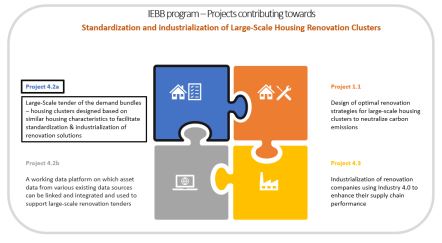| EngD trainee | Anusree Mohan |
| Project | Design of a tendering mechanism for renovation of housing clusters. Standardization & Industrialization of Large Scale Housing Renovations |
| University supervisor | dr.ir. L.C. Lisanne Havinga, dr. ir.-Arch. P. Pauwels |
| Company supervisor | ir. Kees van der Leun |
| Name of company | Guidehouse |
| Period of project | September 2020 – August 2022 |

Introduction
Scaling-up sustainable housing renovation: Designing a housing classification system and tendering mechanism to achieve standardization and industrialization The renovation process is essential to reform the existing housesin the Netherlands to carbon-neutral, energy-efficient, and future-proof ones by 2050. To achieve this aim, the housing renovation process needs to be scaled up from a few thousand houses being renovated per year to 300.000 a year. But the challenge is that the current housing renovation market still remains very small, traditional, fragmented, and highly expensive. In this market, to promote innovation, standardization of renovation solutions, and industrialization of the production lines, the housing renovation demand must be bundled together in a homogenous and predictable way. Therefore, this project focuses on designing a housing classification system and tendering mechanism for large-scale housing renovations to promote standardization and industrialization of the renovation industry. The hypothesis is that the housing classification system should consist of large-scale housing clusters with similar housing characteristics and similar renovation solutions. These large-scale housing renovation clusters can then be tendered on a large scale that helps the supply side to produce standardized renovation solutions through industrialization and digitization. This project investigated the merit of this hypothesis by exploring methods to design large-scale housing renovation clusters. A key challenge was the identification of the main housing characteristics that should govern the large-scale clustering of similar houses to facilitate and promote standardization. Lastly, the critical housing data required by the renovation companies to provide a good-enough quote for large-scale housing renovation tenders were also explored and determined. The challenges to attaining these results were overcome by the constant collaboration with the renovation industry experts from frontrunner contractors through surveys, interviews, meetings, and workshops. The final housing classification system that was designed in collaboration with the industry experts consists of 14 housing clusters, being distinguished based on the existing insulation level of the roof, facades and windows, and the roof shape. The industry experts agreed that such a housing classification system would be imperative to facilitate them to standardize, industrialize and innovate their renovation processes. This project is executed as a part of the IEBB (Integrated Approaches for the Energy Transition in Existing Buildings) innovation program, work package WP 4.2, launched by the BTIC (Construction and Technology Innovation Center). This project contributes to the future development of the National digital platform, which aims to scale up the renovation process and achieve sustainability of houses in the Netherlands.
